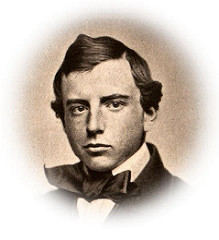London, September 7, 1861
Yours in answer to mine written after the Bull’s Run arrived last night and I answer it at once. Whatever weight your arguments might have had on me in ordinary times, just now they are entirely superseded by the new turn things have taken since that letter was written. I could not go home now if I would, nor would if I could. Work has increased to such an extent since our return from our excursion that I am absolutely necessary here. Things have taken a turn which makes it every day more probable that we must sooner or later come into collision with England, and of course with that prospect I can’t leave the Chief and the family in the lurch. So you need not at present feel any alarm about my blundering home, as you call it, for I promise you fair warning so that you may be down at the wharf to receive me with the towns-people.
Warning you to preserve it a profound secret, I will disclose to you some of the horrors of the prison-house. Remember, your finger ever on your lip.
You may or may not be informed that among the first instructions to the Chief from the Department was one directing him to offer to the British Government the adhesion of the United States to the four articles of the Treaty of Paris. They related as you know to privateering, neutral goods, neutral flags and blockades. The Chief obeyed instructions and ever since we have been here this matter has dragged its slow length along through strange delays, misunderstandings, and discussions that in so simple a matter were very curious and inexplicable. At last the Chief acting under repeated instructions, broke through all objections and brought it to such a point that he and Mr. Dayton were agreed to sign the Convention on the same day at Paris and London, with Earl Russell and with Mr. Thouvenel. The day alone remained to be fixed.
Such was the condition of the negotiation when we went off on our excursion. Before we had returned a note was received from the Foreign Office suggesting a convenient day for signing, but transmitting also the draft of a declaration outside the treaty itself, which Earl Russell proposed to read before signing. It ran as follows:
“In affixing his signature to the Convention of this day between H. M. the Queen of Great Britain and Ireland and the U.S. of A. the Earl Russell declares by order of H. M. that H. M. does not intend thereby to undertake any engagement which shall have any bearing direct or indirect on the internal differences now prevailing in the United States.”
On receiving this Note the Chief sat down and wrote an elaborate reply. It was in his best style and was certainly an admirable paper. After tearing the whole thing up and placing, as it seems to me, the British Government in a very awkward and untenable position, he ended by breaking off the negotiation until further instructions from home should command him to resume it. This Note Earl Russell has never replied to. A few days after he sent an answer which sounded to me rather like an apology than anything else, but in this Note he said that he should defer the answer to another time.
So that passed away, but only to give place to a greater excitement. Last Monday a special messenger arrived from Seward bringing the package taken on Mure, directed to Lord Russell. But besides this, which was legitimate, or might be, as coming from the British Consul at Charleston, a great quantity of letters were found on Mure, and among others one that very gravely compromised the British Government. It seems that the British and French Consuls at Charleston have acted in concert in making a treaty with Jeff Davis, and that treaty nothing less than this very Convention of Paris.
Here was a pretty to-do. Whatever we might suspect, there was no direct proof against England or France nor was it our interest to make a quarrel. So the Chief sits down and writes a long despatch to Lord Russell complimenting very highly the perfect confidence to which the British Government were entitled, and returning to them the bag of despatches. In another short Note he quoted the letter I have mentioned, and demanded the Consul’s recall.
To these Notes no answer has yet been returned. No doubt the graveness of the matter will make a Cabinet meeting necessary, and just now every one is out of town. Lord John however was in Paris on Sunday. Was it to consult with the French Government? You see what a dreadfully tight place they’re in and how inevitably the inference of bad faith of a very gross nature is against them.
These are the signs of the times and will no doubt alarm you enough. I am myself more uneasy than I like to acknowledge in my public letters, but hope we shall worry through yet. They won’t like the idea of our privateers here when it gets near them.
As for your recommendation to set up here as letter-writer to the Times, you know not what you say. In the first place, all that I know comes from my position and without it I were nothing. In the second place, there are few beings lower in the social scale in England than writers to newspapers. I should destroy myself beyond a hope of redemption.
No, I am very well as I am. I shall gradually make way and worry along. London does not satisfy all my longings, but enfin it is an exciting, hard-working life here, and the Chief and I are as merry as grigs, writing in this delightful old study all day long, opposite to each other. When I say delightful I stretch a point, but it is not bad. . . .
